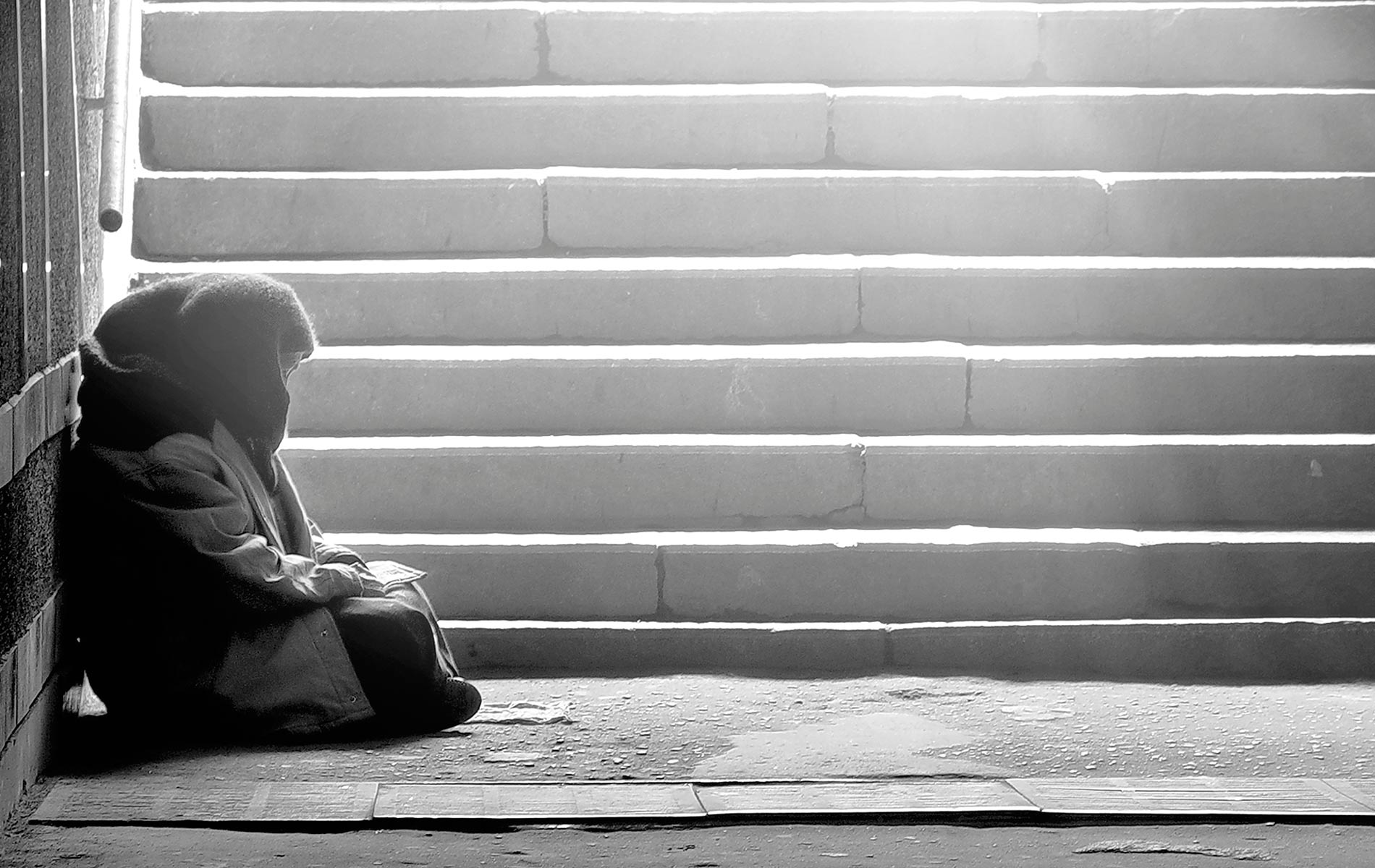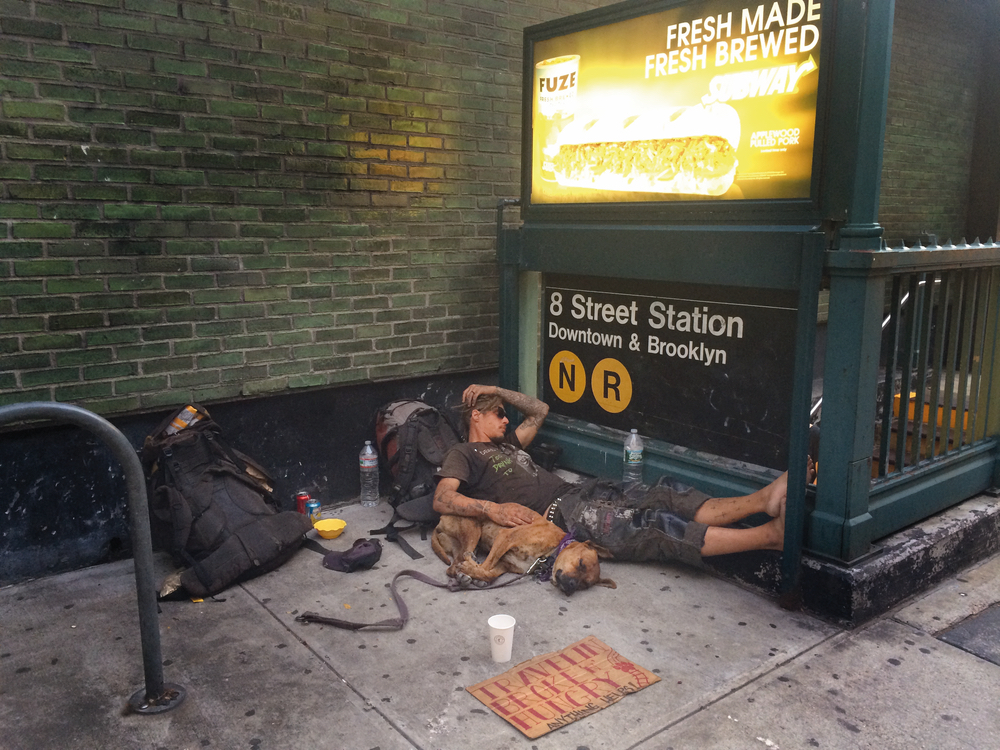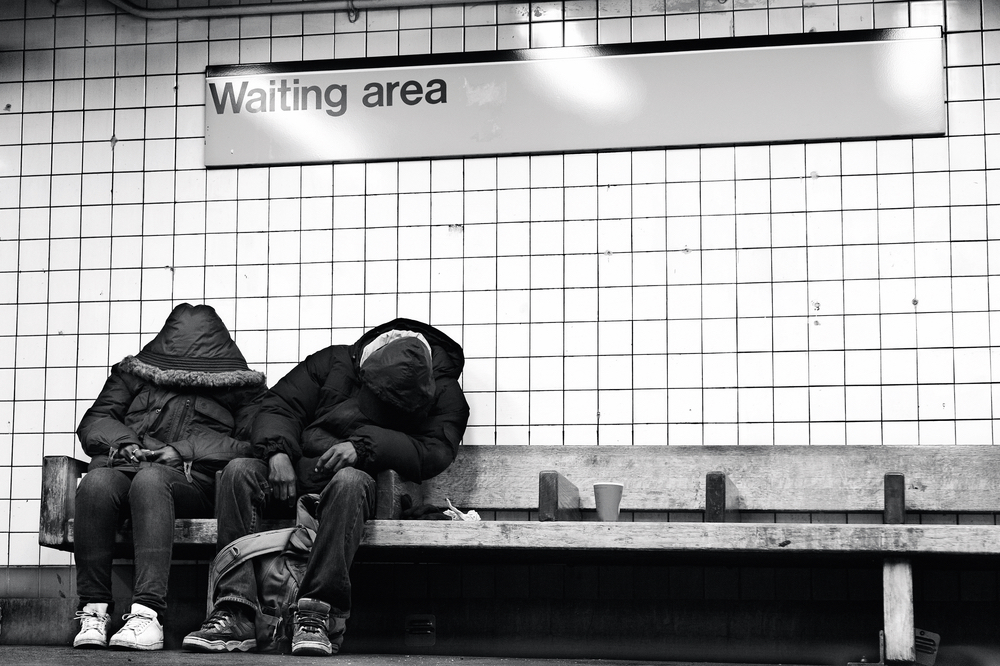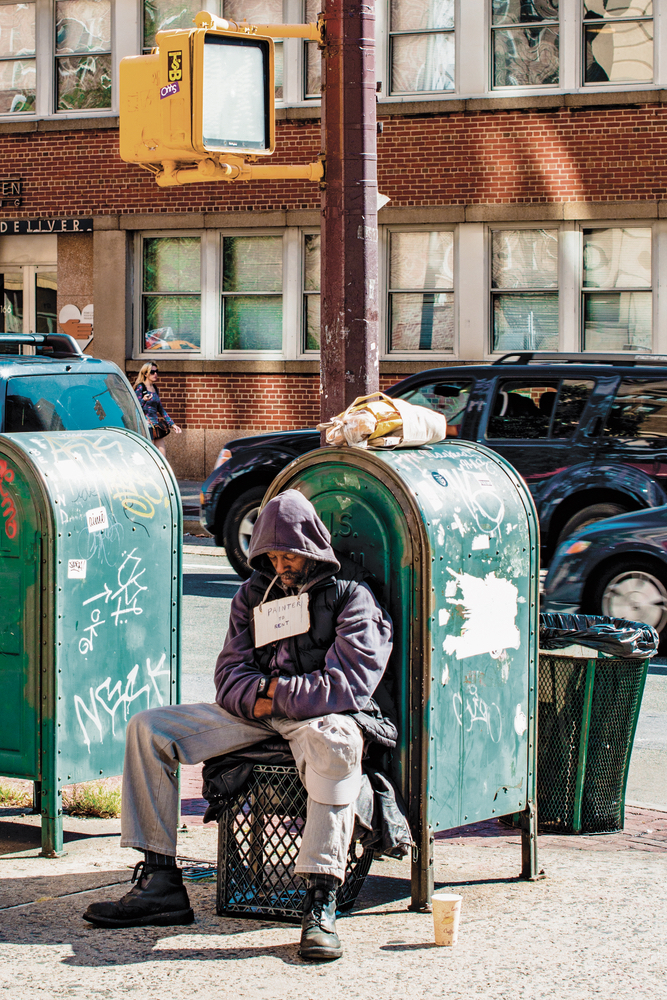
vie-magazine-homelessness-hero
Photo by Arman Zhenikeyev, Shutterstock
LOOK.
The Homeless Are Not Invisible
By Jeremy Reynalds, PhD
“When poverty knocks on the door, love flies out the window.”
It was just a simple quotation spoken by American celebrity TV Chef Robert Irvine on his cooking show, but it grabbed me the minute I heard it.
In the United States, the majority of citizens probably don’t give much thought to how to survive day by day. We live in what many call “the First World,” where concerns are more related to how to snag the latest iPhone model than finding a safe place to sleep at night. We may think homelessness is a condition that happens to other people, not ourselves.
However, as CEO of Joy Junction, New Mexico’s largest emergency homeless shelter, I see those in states of extreme poverty and despair on a daily basis, and I was curious to find out what our guests felt about Robert Irvine’s statement.
One male guest said his poverty and consequent homelessness resulted in his finding out “people’s bad ways.” He continued, “Their attitude changed toward me. Some people would come up and laugh at me.”

Photo by William Waldron
Another Joy Junction guest said she became homeless at the age of thirty-five. “I lost a beautiful four-bedroom home. I lost all sense of safety and security, life, and my world as I knew it. My world was completely turned upside down.” Friends and family began to judge her and turned their backs on her and her children.
She said, “They never offered to help us.” However, it wasn’t all bad. Her relationships with her children, who were four, ten, and fourteen at the time, deepened. She said, “My two older children understood what had happened and knew that we needed to get closer.”
One guest said that when she first became homeless, her family made the situation even worse. However, that wasn’t the case with her relationship with her husband. “We are now stronger as a couple because we needed to rely on each other when others abandoned us. We’ve learned to be more supportive of each other.”
It was an everyday battle trying to figure out how to pay for our hotel room again. Most of the time, we would sell drugs to come up with the money, but some days, there were not enough sales. I started shoplifting merchandise from stores.
A forty-year-old woman said that when she became homeless, it affected her relationship with her husband, her kids, and others around her. It was deeply stressful. “It was an everyday battle trying to figure out how to pay for our hotel room again. Most of the time, we would sell drugs to come up with the money, but some days, there were not enough sales. I started shoplifting merchandise from stores.”
Another guest said his homelessness has had a big impact not just on his children and their mother but also on his own mother and sisters. He said, “They worry all of the time about how I’m doing, where I’m at, and if I’m eating well. They especially worry about if I take care of myself. And if I have a safe place to sleep at night throughout this cold season.”
So the question remains: When poverty knocks, does love fly out the window? Answers vary, but there seems to be no doubt that lack of money can lead to a crisis.
A Mixed Bag Full of Trouble
One definition of a crisis is “a time of intense difficulty, trouble, or danger.” That applies well to the homeless person’s everyday existence. Some American statistics show that 78 percent of all sheltered homeless persons are adults. Of those, 61 percent are male, 62 percent are members of a minority group, 38 percent are thirty-one to fifty years of age, 64 percent are in single-person households, and 38 percent have a disability. Two-thirds have stayed in an emergency shelter or transitional housing program, and one-third have lived on the street or in an abandoned building or other dangerous places. News stories of homeless people being killed for no reason in such places sometimes appear in cities across America.
There are hundreds of reasons why people are homeless. A lack of affordable housing, the limited scale of housing assistance programs, and an epidemic of home foreclosures have contributed to a booming housing crisis and homelessness.
[double_column_left]Other reasons for the rise in homelessness include the lack of employment opportunities and a decline in public assistance. The official poverty rate in the United States was 13.5 percent in 2015 with 43.1 million people living in poverty. Homelessness and poverty are closely linked because poor people cannot pay for housing (which absorbs most of one’s income), food, childcare, health care, and education. With very limited resources, it is often housing that is dropped.
[/double_column_left] [double_column_right][/double_column_right]Sinking into homelessness often begins with the abuse of alcohol or drugs to mask unbearable emotional pain. The substance soon becomes a cruel taskmaster, and the quicksand of addiction begins.
Deficiencies in available health care also contribute. A serious illness or disability can start a downward spiral to eviction and eventual homelessness. Many people are a mere paycheck or illness away from homelessness.
Domestic violence forces many women to choose between living in an abusive relationship and being homeless.
Alcohol and drug addiction can also lead to homelessness. Of course, not all who are addicted become homeless, but poor people who are addicted are clearly at increased risk.
A sixty-one-year-old Joy Junction guest confessed, “It’s breaking my heart” to be homeless. She said she has been homeless for four years, and her age and dental problems have made it very difficult for her to find work. Would it be fair to say she’s been in crisis for four years? I think so.
Our Joy Junction Facebook followers have commented that homelessness has long been a crisis. One person wrote, “Some people just have worn blinders.” I called one of my previous books Now You See Me because I believe featuring actual people and the reasons they became homeless helps to remove those blinders.
So do we have a homeless crisis in Albuquerque? We do, every day, when you define the word crisis as “a time of intense difficulty, trouble, or danger.”
To give or not to give? That is the question.
Sometimes, the homeless reject our offers of help. Although we might find ourselves saying, “Well, he doesn’t want help,” we need to go beyond that. My thirty-four-plus years among New Mexico’s homeless have convinced me that people don’t set out to be homeless.
Sinking into homelessness often begins with the abuse of alcohol or drugs to mask unbearable emotional pain. The substance soon becomes a cruel taskmaster, and the quicksand of addiction begins. A bed in an apartment is exchanged for a precarious existence on city streets, where an addict wanders and wobbles from one fix or high to the next. It’s a familiar dilemma. How do we compassionately help the homeless without having to arrest them? The answers depend on which side of the fence you are on.

Photo by elbud, Shutterstock
Sometimes, local businesses struggle to keep the homeless from panhandling and leaving trash, vomit, and feces on their properties. One former shopping center manager wrote me that the homeless would sleep in the bushes by her building. Every Monday, her crew would collect a thirty-three-gallon bag of beer cans and bottles and would have to hose off urine and vomit and clean feces off the property. She said, “We would have to call the police because of the safety and cleanliness we owed the customers of our tenants. Some simply don’t want to be helped.” Is that really true? We asked some of our guests who had survived alcohol or drug addiction to describe what addiction did to them.
A fifty-six-year woman said she had been “drinking, drugging, and having sex” since she was thirteen. “The unremembered days, blackouts, drunken sex, STDs, the violence, hurt to family and friends, the hurt to my self-esteem, loving, resentment of myself, my broken bones, being beaten, and suicidal thoughts. I was hungry, thirsty, and scared. Many times I’ve been used and abused, and with all of this comes defecating, urinating in public, and soiling myself.”
Another heroin- and meth-addicted guest said her addiction caused her to give up her children’s custody to her parents. “This caused me to have a very bad relationship with my family. It has also caused many physical problems such as permanent track mark scars, Hep C, and messed-up teeth.” The situation got so bad that year that she ended up hospitalized as the result of an infection incurred from shooting up in her leg. While she was in the hospital, she decided to get clean. “I’ve been clean for almost seven months.”
For addicts and others, panhandling often offers a way to survive. We occasionally hear anecdotal tales about panhandlers who make hundreds of dollars a day. The truth is often very different.
One guest said her worst time panhandling was on her daughter’s birthday. “I put a birthday pin on her while I panhandled. I spent the money at the Dollar Tree and bought her a birthday balloon. I will never do it again.”
[double_column_left]
Photo by Frank Gaertner, Shutterstock
Another person related a sad story. After her sister had died, the family was unable to afford the burial cost. “I wasn’t working at the time, so I made a big sign asking for donations. One woman looked at me like I had dirt on my face.” However, the panhandler did raise $70 and a gift card. Someone else said he had panhandled mostly for food and occasionally for shelter and clothing. He said his worst experiences were when people were “rude or mean.” He added, “These experiences just bring me down, and I’ll stop for that day, but I’ll have no food (money) for that day.”
[/double_column_right]We decided to find out for ourselves what panhandling is like.
A few years ago, a Joy Junction staff member dressed up in jeans and a stained T-shirt and stood on a busy corner with a sign. At the end of the day, she walked away with about fourteen dollars and food from McDonald’s given to her by one woman who had leftovers from a recent order. All the money was donated to Joy Junction.
What is the best response to the homeless and hungry?
As a rule, I suggest that as opposed to giving money, give a gift card to a fast food restaurant. At a minimum, recipients will be able to get themselves something to eat. If you choose to give money, do so with no expectations as to how it will be used.
Then, do more if you can. A simple hello or eye contact goes a long way. Find out the person’s name. One homeless resident of Joy Junction reminded me the homeless do have names and that we should use them.
The Rewards of Kindness
A male guest told us what caused him to change his life. His meth addiction made him think he was invincible. “I remember one time when I was high, I was very well dressed, but there was no restroom around. I even looked for a bush but found nothing. I had no choice but to defecate in my pants.”
What was the turning point? He said, “I remember that after I bagged the pants and threw them in a waste bin, my apartment manager found them and had them cleaned for me. What a great man! I’ll never forget his generosity. That kindness caused me to change my life and try to find help.”
I remember that after I bagged the pants and threw them in a waste bin, my apartment manager found them and had them cleaned for me. What a great man! I’ll never forget his generosity. That kindness caused me to change my life and try to find help.
From a personal standpoint, I hate to think what would have happened to me if years ago people had written me off as worthless and lazy. Instead, kind people helped me and gave me work as well as a place to stay.
Here’s the moral: Each of these kind people could have closed their doors to us. Today, I see lives transformed by helping and caring people who volunteer at Joy Junction or who help the seemingly helpless in a variety of ways. Whether in the United States or elsewhere, you can be one of them.
Is there a homeless crisis in your city or community? Ask yourself if you see it in the faces of people or whether it’s just something you hear about. Let’s continue the discussion and come up with creative solutions to better the plight of those most unable to take care of themselves. Such a discussion can do nothing but good because to be blunt, homelessness sucks. Just ask a homeless person, wherever they may be in the world.
— V —
Dr. Jeremy Reynalds was born in England, immigrated to the United States in 1978, and is now a US citizen. After being homeless for a time, Jeremy founded a ministry for the homeless in Santa Fe and is founder and CEO of Joy Junction. He has a master’s degree in communication and a PhD in intercultural education. Reynalds has authored several books on the subject of homelessness including A Sheltered Life: Take It to the Streets, Homeless in the City II: A Mission of Love, and Two Hearts, One Vision: Helping the Homeless Together.
Share This Story!
KEEP UP WITH THE LATEST STORIES FROM VIE


















































































































































